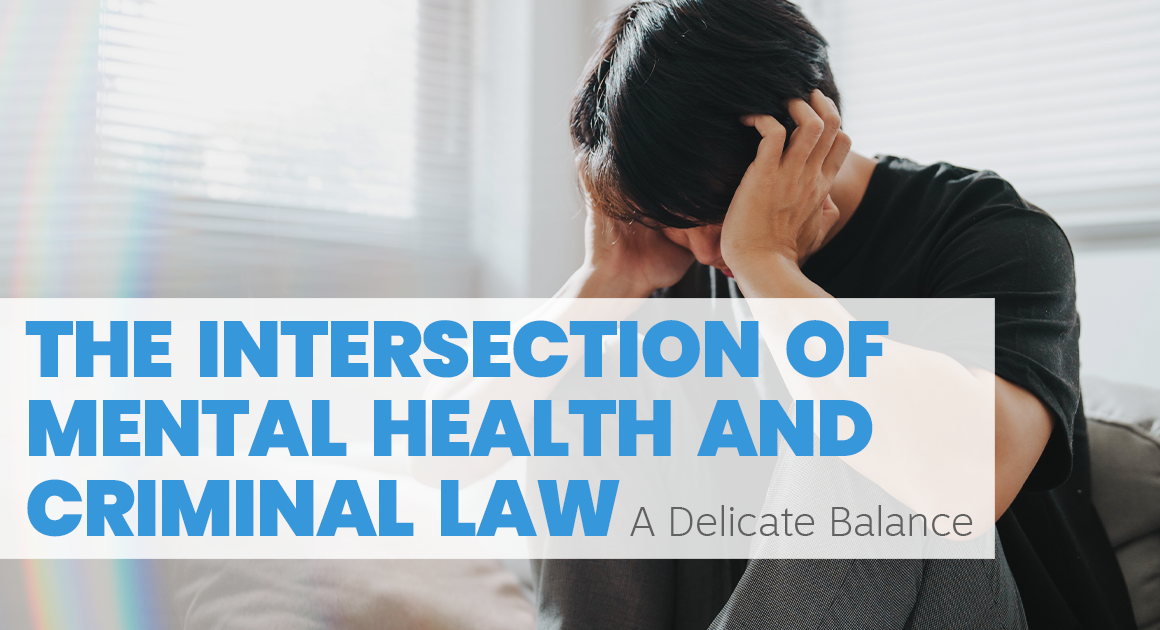The intersection of mental health and criminal law represents a complex and nuanced area that requires a delicate balance between safeguarding public safety, ensuring fair treatment of individuals with mental health issues, and upholding justice. It is essential to recognize the importance of mental health, its impact on criminal behavior, and the crucial role of a criminal defense lawyer.
This blog is for informational purposes and should not be considered legal advice.
Understanding the Relationship Between Mental Health and Criminal Justice
Mental health issues can play a significant role in criminal cases and often carry a stigma in the context of criminal justice. To navigate these highly complex scenarios, legal professionals must have a thorough understanding of mental health and its impact on criminal behavior.
According to the National Alliance on Mental Illness(NAMI):
- People with serious mental illness are booked into jails 2 million times each year.
- About two in five people who are incarcerated have a history of mental illness.
- 70% of youth in the juvenile justice system have a diagnosable mental health condition.
Identifying mental health issues in criminal cases is a major challenge for legal professionals. It involves collaborating with mental health experts and recognizing the signs and symptoms of different mental health disorders, as well as understanding how these disorders can influence criminal behavior.
The Insanity Defense in Criminal Law Cases
Establishing Insanity
States rely on four tests to determine whether a defendant is legally insane. The laws of your state will establish which of these four tests applies. Kansas does not allow for the insanity defense.
Under the M’Naghten Rule test, the criminal defendant must either not understand what he or she did or be unable to distinguish right from wrong. This test relies on the notion that defendants may be diseased and incapable of understanding their own actions.
The Durham Rule holds that if a criminal defendant’s “mental disease or defect” was the reason that they committed a crime, the defendant is not guilty because of insanity. This test is currently used only in New Hampshire since other states and jurisdictions have deemed it too broad.
The irresistible impulse test is used to determine whether, as a result of a mental disease or defect, a defendant could not control or resist his or her impulses, thus leading to a criminal act. If so, the defendant is not guilty by reason of insanity. Some states consider this test in combination with the M’Naghten test, holding that when a defendant cannot understand or control his or her actions, the insanity defense applies.
Under the Model Penal Code, the insanity defense applies when, because of a diagnosed mental disorder, the defendant could not understand the criminality of his or her actions or was unable to “act within the confines of the law.” This test is still used in many states, but it was criticized after it led to the acquittal of John Hinckley.
(SOURCE)
Implications for Criminal Justice
Legal professionals must maintain a delicate balance between the intersection of mental health and criminal law to ensure their client’s mental health is considered throughout the legal process. Utilizing expert testimonies from mental health professionals to provide a comprehensive understanding of underlying health issues will help ensure that both the criminal and mental health needs of the individual are met. Recently, societal attitudes toward mental health have shifted, leading to changes in mental health policy and law enforcement strategies.
If you or your loved ones need help navigating the complexities of mental health and criminal justice, contact the Law Offices of Reginald Keith Davis for your confidential consultation.
Hablamos español!

